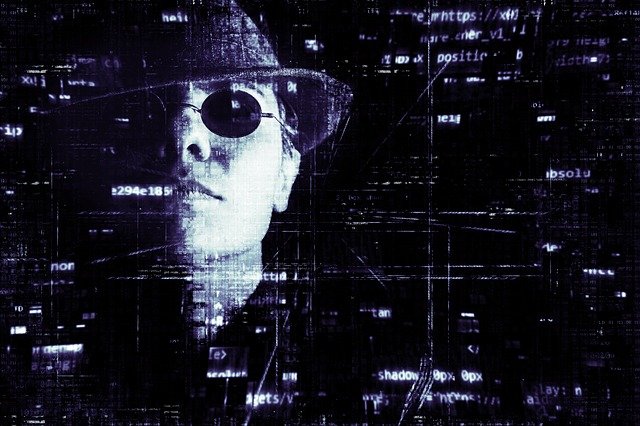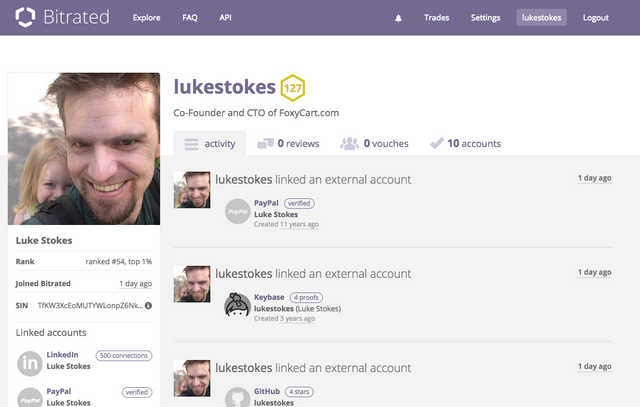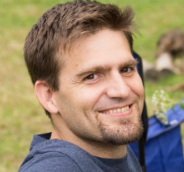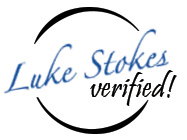Privacy, Identity, and Human Flourishing
Do you value your privacy? Do you want to be known? What would you trade in order to flourish?
Who Are You Online?
I recently found out about Bitrated which is a pretty cool concept for determining trust and facilitating trades. You can find me there at https://www.bitrated.com/lukestokes.
I'm a fan of systems like this because I think there is great value in having a strong online identity which you control.
You can also find me on Keybase and Onename as lukestokes:
https://onename.com/lukestokes
Trust is so important. We are a relational species and so much of our existence revolves around the relationships we build and the trust those relationships contain. Most jobs, marriages, and major life decisions are influenced most by those we trust. I believe our desire to be known is critical to our wellbeing.
Some may argue your online and offline identities should be separate. I'm of the opposite opinion. I think the future will merge technology so seamlessly into the human experience that a distinction will seem primitive. I do my best to maintain integrity, not just honesty and moral uprightness, but also wholeness. I try to be the same person online and in person. Tools like Bitrated, along with my various social media profiles, are my digital identity. They not only provide me with great joy, education, and entertainment, but also with meaningful relationships and the sharing of ideas which shape who I am.
But What About Privacy?

Privacy is an incredibly important topic, but I wonder if we are thinking about it with the proper perspective. I recently read a great post which got me thinking about this even more: The Birth And Death Of Privacy: 3,000 Years of History Told Through 46 Images.
Privacy is a relatively new thing. I also think it's a good thing, but it's not essential for our survival, as demonstrated by the many thousands of years we didn't have it. I value privacy on specific things which keep me, my family, and myself in the past (i.e. my property) safe. That includes passwords, encryption keys, safe combinations, and physical keys. Without this protection, my property could be controlled by others or used to manipulate me.
When our private lives can be used against us, we lose autonomy and control of our own outcome. At the same time, I also think a person of complete integrity has very few weaknesses to exploit. If my public and private actions are consistent, then there are no surprises which could be used against me to discredit me, shame me, or somehow control me. I recognize myself to be in a privileged position as I have no employer to answer to since I run my own company. That said, I also think many would enjoy living this way but instead have to hide parts of who they really are out of fear.
What if we could live without fear?
What Does Flourishing Look Like?
What would it be like to walk down the street and see signs over peoples' faces (kind of like Daniel Suarez's Freedom (TM))?
One might read:
Sociopath: Not to be trusted.
Another might say:
Moralist: Trusted with a strong reputation score.
How would that impact our daily lives, our businesses, and the relationships we build? Some might think of Blank Mirror's Nosedive episode where most actions are fake and revolve around building reputation scores.

But I don't think it will be like that because we, as a species, strive for authenticity. Even children can tell when someone isn't being genuine. If all interactions with others, even strangers, could be based on proven, demonstrated trust, what might that do for our wellbeing? If someone needed a loan or even a handout, and they were trustworthy to use it for good to better themselves and the world around them, many would be glad to give. What if many bad actors could simply be ignored?
Am I too much of an idealist?
What are your thoughts on privacy, online identities, and how it all relates to human flourishing?
Luke Stokes is a father, husband, business owner, programmer, voluntaryist, and blockchain enthusiast. He wants to help create a world we all want to live in.



Well... I hadn't expected this to be six months back. :cP Clearly you've been mulling over this idea a fair bit.
To begin from the end - to court idealism is to aspire to that which the World is not but could be. The only way to overindulge is to aspire to a World that could not be. As for what would constitute such - opinions will vary broadly - with some suggesting that if one can dream it - then it can be.
Your reference of 'Freedom' also reminds me of Ripley from 'Wargames: The dead code' - in that information on individuals was used to determine whether they are a threat. This highlights the dark side of the level of transparency that flourishing 'could' signify - the danger of being singled out.
And that is the issue with total transparency. It is easy for the mainstream to profess such - but the moment that one steps out of line with the norm - one grows vulnerable - and believe me when I say from experience that even consistency has a tough time protecting the self from the potential ills of being singled out.
Incidentally I was swallowed up by that medium article linked. Such great information - and it provides me cause to clarify that my objection to total transparency is not an idealistic objection but rather a practical one.
Indeed it seems that your views on online repute and its importance quite coincide with my own - even if I have not heard of many of the services that you have signed up to.
In conclusion - thank you kindly for drawing my attention to this. It was worth digging up. ^_~
I'm glad you enjoyed it! Thanks for reading.
Very interesting article 🙂 Especially the long range survey on attitudes to personal privacy, which is really centered around modesty, not privacy as such.
I think there's some flaws to the arguments as they are presented though, especially one great point: privacy matters a great deal to personal freedom when mass data collection and analysis is possible. This is much more recent than even 150 years but that doesn't make it less of a concern.
This is just an argument against public, open datasets. Privacy could be maintained while allowing researchers to use data by ensuring that they are restricted in their usage. There is no need for data such as this to be publicly available.
As this is the closing argument of the piece, I think it is indicative of the angle of the author, that privacy is actually harmful, and in any case impossible to maintain, with no long term historical precedent. This kind of defeatism is very dangerous and should be resisted.
It says, well you can be tracked and deanonymized anyway, so why bother? I say there's no need to throw the baby with the bath water.
It's common knowledge that politicians and social planners were using the amazing technology of "focus groups" 😆 to predict, assuage and essentially manipulate the electorate in US and UK in the 90s, and since then having graduated to "big data", they have only gotten better, though of course Clinton's recent defeat shows how wrong they can be. Still, the systems will improve and as they do the danger increases. See the recent WikiLeaks cache. I'm not a conspiracy theorist, again this is well known.
The fuel for these engines of control is our data. Perhaps the term needs updating, since there's little in common with stopping (or not) your children watching you have sex and trying to limit access to your medical records. Maybe privacy is not the word, but personal data protection.
Thanks for a stimulating read and think 😊
Thanks for such a great reply, @personz.
Yes, I think you nailed an important distinction I was having trouble making. I think many of our social constraints on modesty (and the supposed moral ramifications that go along with them) are in many ways silly. No victim, no crime type stuff. But being able to protect and secure data about yourself which might be used to impact you negatively, that is important.
At the same time, I'm also a little confused about the huge concerns about medical history. Maybe everyone thinks it'll be like the movie Gattica tomorrow if we know everything about everyone, down to their very genes? What if, instead, we knew enough about others to be more compassionate towards them? What if we knew how someone's health impacted their lives (maybe they have chronic backpain, as an example) so we could be a little more understanding when dealing with them? What more information helped us use non-violent communication more effectively to know what their actual needs are and how we might meet them?
The argument that evil governments can do bad things with our data is more, for me, an argument against having governments or rulers at all. The reason they can do bad things is because of their monopoly use of violence. If companies do bad things, it generally upsets their customer base who seek out competitors (unless, of course, they have a deal with the government to prevent competition via lobbying, revolving door politics, and regulatory capture).
This I completely agree with. This, to me, is all about encryption security and the like. We should all be able to control our own data how we see fit.
Thanks 😁
It's exactly as you describe, it's Gattica except a little more mundane: medical insurance. Instead of determining your job in some utopia / dystopia, it will determine the cost of your health insurance. This could really impact other insurances, such as car insurance, etc., and on the extreme side be used for police profiling.
It can get pretty fanciful, but if you can say with a high percentage of certainty, say even 65%, that you will develop heart disease by the time you are 50, you will see your health insurance rise dramatically, especially as time goes on. If you are able to have your genes profiled and say with some fairly high degree of certainty that you are going to develop a mental illness in your 20s, it's not inconceivable you might end up on some list somewhere.
We might get compassion from the many, I think that is plausible, but I think it is likely that we will get persecution from the few who are powerful. It's not just evil government, but corrupt business practices, practices which are extremely common.
That is why it is so so important to anonymise health records, and even more important to anonymise genetic data.
Just to respond directly to this:
True, but one has to be pragmatic. Many industries, not just specific companies, have a special relationship with government and it's often not as simple as just switching company (voting with your dollar) due to collusion and even regulation. Examples are banking, insurance, legal and anything else which is a legal requirement to interact with. It's the real reason why the banks had to be bailed out in the recent crash, even though it was immoral.
Before we have anarchy, these concerns are valid.
Thanks for a great article.
Trust and transparency are key words. There should be some privacy, as I see it, when it comes to your personal life. As Marly put it - be yourself and hones to yourself off and on line. Let your values and actions resonate your soul :)
Your post was upvoted, resteemed and featured on Steemit Appreciation Friday No. 11 - thank you for contributing to the community.
Thanks for the feature!
You are welcome.
Thank you for writing here. I appreciate your openness, knowledge and positive approach.
That is why some cannot use their own name, as there are very powerful people who would easily focus their efforts at locating and sticking them in gitmo or some other place nobody has heard about, simply because they can, not because those people actually did anything wrong.
People need anonymity when exposing the evils of the world as not everyone is willing or has the option to not compromise their family and friends, very few have the option of staking only their well-being and not anybody else.
With the numerous technologies of tying someone to a unique identifier, for example my verified facebook, but also through voice, facial or even fingerprinting, anonymity could be maintained as well as uniqueness, so there are ways to deal with this and also consider the less fortunate that staked their life to speak the truth for the benefit of the world.
I agree with much of what you said, but I also think the power authorities have over the weak is power given to them by the masses. It's our believe in authority that gives authority power to rule. I also see some counter examples where people have made their identities known while speaking out against power and they are being regarded as heroes by many. What if we just need more people to take similar public action? Could that eventually bring about a tipping point?
I hear your point though. The less fortunate certainly are more vulnerable and at risk. My hope is to get more people up Maslow's Hierarchy to decrease the number of people who are less fortunate.
Yes but the aggressors I am talking about (gitmo) don't need any peoples' power, for example even in the eventual worst case scenario of ww3, they would become authority because of their armaments and numbers compared to any other organization.
It's a tough cookie to handle. For example Chelsea Manning, nobody could have stopped what had happened, not even political asylum, the power that the military has over people has been squashed with the rebellious deserters that managed to stop the Vietnam Conflict (watch Sir, No Sir, the full version not the 45 minute that's everywhere online). The only alternative for such people are to remain silent or higher risk alternative of anonymity.
Coming from YouTube as a vlogger, the need for so many here to have total anonymity is a bit of a change. I liked your perspective.
Thank you! :)
Thank you for this great article ~ and thank you for Being You!
Reiki Blessings and Hugs! Namaste
You're welcome!
Some of the terms you use in this post intrigue me. Human flourishing is a supreme value, I agree. Have you read Philosophy: Who needs it, Luke? I'd very much recommend it.
Finished listening to it this past weekend. I enjoyed it. Thanks for the recommendation.
You're very welcome!
Ah, looks interesting. I'll check it out, thanks!
Great post @lukestokes and ¡Yes! you may well look like an Incurable Idealist to the world.. On these privacy regards. ;)
Especially if you really are a Highly Honest, Dry Coherent Think Tank, Crash-Dummy Eloquent Talker, Formidably Transparent Truth Seeker & above all, A Straight Maverick/Outcast as I sense and I fear that we both probably are. LoL
Hah! That's a lot of big words right there. Thanks. :)
I have been making lots of responses about psychopaths today.
With people who are not psychopath / narcissists you can talk and rationalize, and expect them to have some understanding of reciprocity.
They exist on a scale of absolutely trustworthy to will steal everything not nailed down.
Psychopaths are a different story. They will destroy you. They lie as a matter of course, and some are incapable of telling the truth. They have no remorse from killing someone, but do have fear of getting caught, but the also get the elation of pulling one over on the stupid people.
Recognizing a psychopath is easy, if you know what you are looking for/at.
They are nothing like what the movies portray them as.
They look like Chump and Hitlery.
They are usually extremely charismatic, and know how to turn on the charm.
Our problem is that we have let them create pyramidal structures. The psychopaths love to be in control, and pyramid structures let them get there.
Else, these people are only 5% of the population, and without authority, they can be pretty much ignored. So what if they steal for a living? That's 5% of the GDP. Currently they steal 110%.
Yep. Authoritarian structures backed by violence attract them as well. I'm not sure I'd say recognizing them is easy though because, as you said, they are usually extremely charismatic. I imagine a future where they will be easier to spot, and we can work towards meeting their needs without harming anyone.
great posting... voted and followed friend...^^
Thank you so much! I always greatly appreciate a new follow.